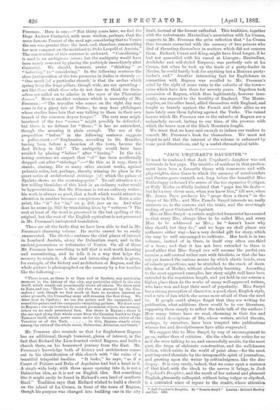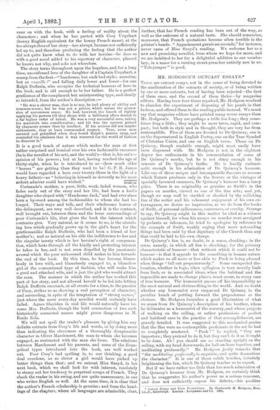"JACK URQUHART'S DAUGHTER."
IT must be confessed that Jack Urquhart's daughter was not fortunate in her papa. The troubles of maidens in that predica- ment have been a favourite theme with romancers and with playwrights, since times to which the memory of novel-readers and theatre-goers runneth not, long before the beautiful Miss Fotheringay redeemed the errors of the too expansive Costigan, or Polly Eccles so filially insisted that "papa has his faults— but he's a very clever man, when you know him," till now, when Mr. James Payn produces his "grape from a thorn" in the shape of his Ella ; and Miss Pamela Sneyd interests us, really interests us, in the sorrows and the trials, and the over-tragic ending, of poor Corisande Urquhart.
Mrs. or Miss Sneyd —a certain neglected humomist has assured us that every Mrs. always likes to be called Miss, and every Miss to be addressed as Mrs.; he "doesn't know why they should, but they do ;" and we hope we shall please our authoress either way—has a very decided gift for story, which she may be well encouraged to cultivate. Her book is in two volumes, instead of in three, in itself very often one-third of a boon ; and that it has not been extended to three is proof either that Miss Sneyd (we will assume the prefix) can exercise a self-control rather rare with fabulists, or that she has not yet learned the various means by which elastic bands, even of minute proportions, may be stretched to the crack of doom (the doom of Mudie), without absolutely bursting. According to the most approved examples, her story might well have been extended to the regulation length, and yet held in our esteem a higher place than do the works of many well-approved writers, who have won and kept their meed of popularity Miss Sneyd has a strong perception of character, a good, clear, English style, and a vein of fun which she seems more afraid of than she need be. If people could always forget that they are writing for publication, what additions there would be to our literature, supposing them simply to reflect the table-talk of the authors ! How many letters have we read, charming in their fun and their vivid descriptions of life, whose writers, misled thereto, perhaps, by ourselves, have been tempted into publications whence fun and descriptiveness have alike evaporated.
We suggest this to Miss Sneyd, by way of encouragement to go on, rather than of criticism. On the whole, she writes for us as if she were talking to us, and successfully avoids, for the most part, the traps of elaborate construction, and the well-known diction, which exists in the world of print alone—for the most part imported thereinto by the irresponsible spirit of journalism, and growing upon the writer by self-indulgence, like the dire dropsy. It is very rarely, indeed, that we come upon a sentence of that kind, with the shock to the nerves it brings, in Jack Urquhart's Daughter, and the result of her natural and pleasant English, pleasantly colloquial, without being vulgar or slipshod, is a contented sense of repose to the reader, whose attention Jack Urqahart's Daughter. By " Pamela Sneyd." London ;Richard Bentley and Eon. 1882.
runs on with the book, with a feeling of reality about the characters ; and when he has parted with Cosy Urquhart (bonny English equivalent for the bonny French name), at the too abrupt close of her story—too abrupt, because not sufficiently led up to, and therefore producing the feeling that the author did not quite know what to do with her heroine—he does so with a good novel added to his repertory of character, pleased he knows not why, and asks not wherefore.
The story turns throughout upon the hopeless, and for a long time, unconfessed love of the daughter of a Captain Urquhart, a
scamp from the first—" handsome, but such bad style ; amusing, but so canaille r and falling daily lower and lower—for one Ralph Dufferin, who occupies the technical honours of hero in the book, and is old enough to be her father. He is a perfect
gentleman of the complacent but uninteresting type, and clearly so intended, from the author's description :-
"He was a clever man, that is to say, he had plenty of ability and common-sense; but he was not a genius, which means the posses- sion of uncommon sense. He had, however, the knack of rightly applying his powers till they shone with a brilliancy often denied to a far higher order of talent. He was a very successful man, taking his materials into consideration; and his was the success gained by character sooner than by intellect. If his actions did not inspire enthusiasm, they at least commanded respect. True, some men sneered aud grumbled when they heard Ralph's praises sung, and reminded his adniirers that it was reserved for the world of fashion
to discover it."
It is a good touch of nature which makes the man at first rather surprised and ironical over his own fashionable successes (he is the novelist of his set), and the world's—that is, his set's— opinion of his powers ; but at last, having reached the age of thirty-eight, when he is introduced to us—(how much older "heroes" are getting than they used to be ! G. P. R. James would have regarded a hero over twenty-three in the light of a heavy father)—as "believing in himself as devoutly as his most
ardent admirer could have wished." .6611i124116s
CRISIRaa.
Corisande's mother, a poor, little, weak, faded woman, who fades early out of the story and her life, had been a lord's daughter who eloped with "Handsome Jack," and had ever since been a by-word among the fashionables to whom she had be- longed. Their ways and talk, and their wholesome horror of the delinquent, are very well described, and it is the contrast, well brought out, between them and the loose surroundings of poor Corisande's life, that gives the book the interest which contrasts give. Very natural, as it seems to us, is the absorb- ing love which gradually grows up in the girl's heart for the gentlemanlike Ralph Dufferin, who had been a friend of her mother's ; and as natural on his side the indifference to her and the singular beauty which is her heroine's right of compensa- tion, which lasts through all the kindly and protecting interest he takes in her, and is not even dispelled by the passionate avowal which the poor unlessoned child makes to him towards the end of the book. By this time, he has become blame- lessly in love with, and blamelessly engaged to, a blameless girl of the conventional type of fashion, who will make him a good and attached wife, and is just the girl who would attract the man. The manner in which the author has worked this part of her story, and not allowed herself to be led into letting Ralph Dufferin succumb, at all events for a time, to the passion of Cosy, strikes us as showing a real perception of character, and succeeding, in spite of the temptation of "strong scenes," just where the more every-day novelist would certainly have failed. Agnes Sheridan in real life would naturally have be- come Mrs. Dufferin, though the bold connection of two such historically connected names might prove dangerous to M. Emile Zola.
We will not spoil the reader's pleasure by giving him any definite extracts from Cosy's life and words, or by doing more than indicating the cleverness of a thoroughly disagreeable character in Oliver Marchmont, the man to whom she becomes engaged, as contrasted with the man she loves. The relations between Marchmont and his parents, and some of the Evan- gelical types introduced into the book, are well worked out. Poor Cosy's bad spelling is, to our thinking, a good deal overdone, as so clever a girl would have picked up better things than that; and we entreat Miss Sneyd, in her next book, which we shall look for with interest, resolutely to stamp out her tendency to perpetual scraps of French. They check the reader in his swing, and are quite unnecessary, in one who writes English so well. At the same time, it is clear that the author's French scholarship is genuine ; and from the head- ings of the ehapters, where all languages are admissible, clear, further, that her French reading has been out of the way, as well as the outcome of a natural taste. She should remember, moreover, that French quotations become often terrible in the printer's hands. " Appartement garnis an seconde," for instance, never came of Miss Sneyd's reading. We welcome her as a new and promising novelist, from whom we hope for more, and we are indebted to her for a delightful addition to our vocabu- lary, in a name for a ranting street-preacher entirely new to us. " Tub-jumper " is good.















































 Previous page
Previous page